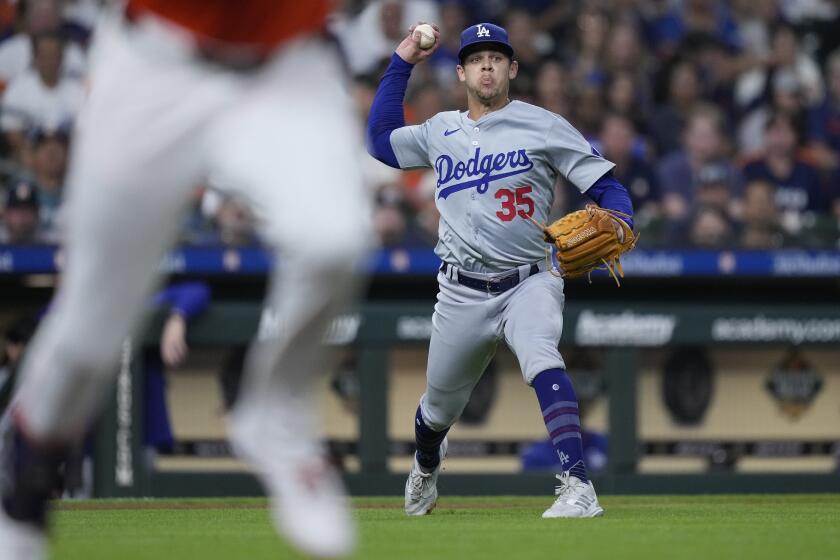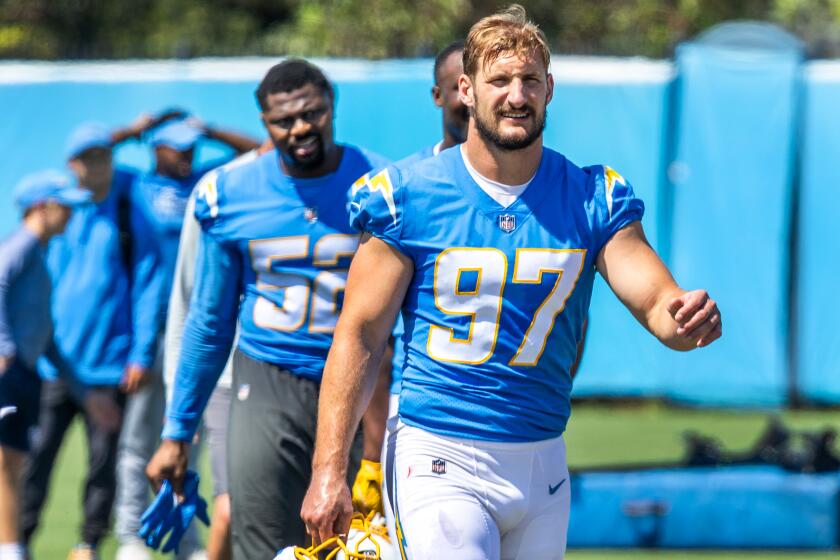Goose Gossage Buttons His Lip, and We’re All the Poorer
Babe Ruth could not have played for the San Diego Padres. He overate, drank, womanized and swore at his manager, Miller Huggins.
Grover Cleveland Alexander could not have pitched for the Padres. Fans know how he came into the seventh game of the 1926 World Series with two down, bases loaded, the winning run on second, to strike out Tony Lazzeri--while half-crocked.
Neither could Ty Cobb, who was too mean. Or Ted Williams, who once flipped off the crowd at Fenway Park and never wore a tie.
Part of our love for these athletes lies in the fact that they played a team game as well as it could be played without losing their individuality and their disdain for authority.
Americans love to snub their noses at bosses, especially when they cloak themselves in nauseating self-righteousness. But when a jock or your average worker lips off about management, is it an offense worthy of punishment such as suspension?
Pitcher Goose Gossage was suspended for public statements about the San Diego Padre front office. After beer was banned in the clubhouse on June 5, he called team president Ballard Smith “gutless and spineless.” In late August, upset about Smith’s decision to offer players only one-year contracts, and responding to Smith’s statement that he would not sign players such as Tim Raines, Gossage said, “He only wants to sign choirboys. I didn’t know you had to go to church before you could play baseball.”
Gossage also commented that team owner Joan Kroc, widow of McDonald’s founder Ray Kroc, was “poisoning the world with her hamburgers.”
Now contrite, the economically prudent Gossage has been reinstated after apologizing, forfeiting his lost wages to charity and assuring us that he will continue to eat at McDonald’s. He thus gets to pitch and be paid for it.
In suspending one of baseball’s better relief pitchers, Smith’s public tone was at times that of a father lecturing a naughty boy: “We expect all employees to do and not do certain things.” Smith can rightfully expect Gossage to control his fastball, But what business is it of his if the Goose can’t control his off-the-field mouth?
Employees are not children. They have opinions, just as their bosses do.
But proving that money does indeed talk, look how often bosses shoot off their mouths with impunity. New York Yankee owner George Steinbrenner, for one, is constantly criticizing his team in public. If he’s not down on the entire team, he’s berating the manager or certain players.
Did these guys buy the right to speak out? Or do we all have the right to talk?
Padre Steve Garvey naively thought that the issue here was freedom of speech, but Smith believed that this was merely a matter of employer-employee relations. As we are fond of saying, this is a free country, and we’re all entitled to our opinions.
Technically, the First Amendment only prohibits governmental restrictions--federal, state or local--on free speech. It doesn’t extend to purely private, economic coercion to keep our opinions to ourselves.
Fortunately, the issue of private coercion in the realm of free speech and thought does not arise often, because most of us are not so touchy or self-righteous as to go around shutting other people up. Most employers have too much sense to dock the paychecks of workers who say something unseemly about them. The rub comes when those with economic power over others use it to impose discipline for speaking out.
This Gossage affair should cause us to wonder if we are as vigilant as we should be when it comes to non-governmental intrusions on our freedom. All good baseball fans should support him in their own self-interest, or the ornery fascinating individuality of our best game will succumb to bland homogeneity.
More to Read
Go beyond the scoreboard
Get the latest on L.A.'s teams in the daily Sports Report newsletter.
You may occasionally receive promotional content from the Los Angeles Times.






